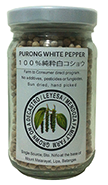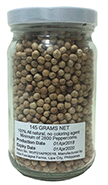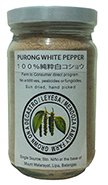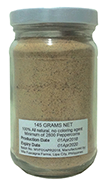PURONG WHITE PEPPER
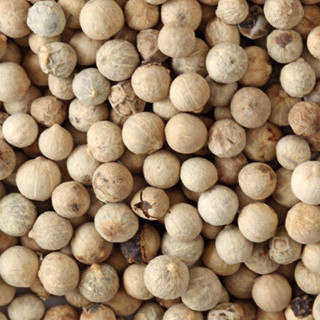 White pepper is the true king of spices. It is spicier and fruitier than
black pepper and is often used to add spice and pepper flavor to light colored
foods where visible specks of black pepper detract from a quality presentation.
Examples are white fish, cream soups ,mashed or whipped potatoes, ramen noodles
and chicken breast dishes.
White pepper is the true king of spices. It is spicier and fruitier than
black pepper and is often used to add spice and pepper flavor to light colored
foods where visible specks of black pepper detract from a quality presentation.
Examples are white fish, cream soups ,mashed or whipped potatoes, ramen noodles
and chicken breast dishes.
White pepper is black pepper (piper nigrum) with the skin removed revealing the
white seed. This is more easily said than done because there are a minimum of
14,000 peppercorns required to produce one kilogram of white peppercorns! The
additional processing cost to skin the peppercorns as well as the weight lost
from the discarded skin explains the high price that white pepper commands when
compared to black..
Villa Fuscagna Farms is perhaps the only grower and producer of whole, grind and
ground white pepper in the Philippines. Our process is entirely safe and
organic. In brief, after picking the peppercorns we separate the red and green
berries manually. Only the fully ripe red berries are then skinned using
chlorinated water and mild mechanical abrasion. They are then dried in our solar
tunnels to a moisture content of 8-10%. Approximately 35% of the "ripe harvest"
are red berries. One kilogram of red berries produces approximately 250 grams of
dry white berries.
We do not use any chemicals to bleach the white berries. Therefore there are
some black specks in the final product (say 0.5% by weight) which come from the
small part of the bean that connects it to the stem. This "eye" cannot be
physically removed and therefore some processors chemically bleach it out. We
also do not used bacterial fermentation to remove the skin so that we can
maintain the food safety standard of the final product.
The time the berry is picked until it attains its final whole dry form is 5-7
days. This improves the whole berry full flavor shelf life to 18 months. We
process the whole berry into grind or ground 7-10 days before delivery to the
customer. We recommend a shelf life of six months for ground or grind product.
All of our white pepper berries are grown on our farm or by other Villa Fuscagna
approved and accredited farms in Sto Nino, Lipa, Batangas. We know exactly where
our berries are grown and how they are grown. This ensures we can maintain
superior quality and safety standards.
